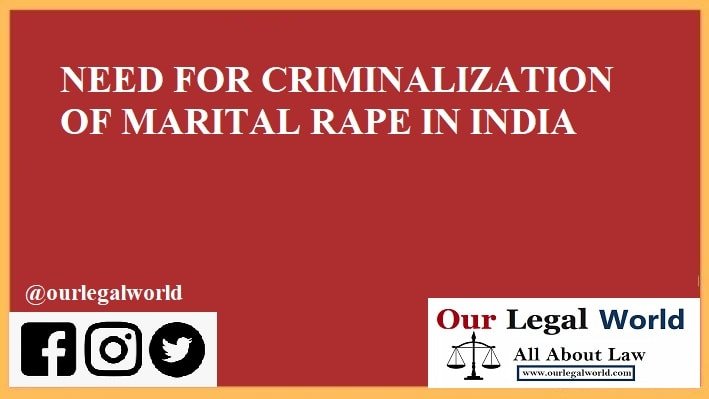NEED FOR CRIMINALIZATION OF MARITAL RAPE IN INDIA
“Sexual assault committed in familiar settingsby assailants known to the victim, including spouses, occur at agreater frequency than those committed in high risk situationsby unknown assailants“[1]
Introduction
Marital rape is not criminalized explicitly in many countries.[2] Even in developed countries like US , the penalty for sexual assault committed by spouseis much less than the other rapes. Apart from this in some countries [3]people who committed offence of rape are exempted from the criminal charges if they marry the victim. Only fifty two countries in whole world recognize marital rape as a crime[4]. Clearly it is not a problem of specific county, but it is now becoming a global issue.
In almost one third of world’s nation , marital rape is exculded from criminal sanctions as well as in human rights approbation. It’s a human rights issue without proper legal remedy. Indian law too does not recognize marital rape as a crime under IPC 1860. After analysing Article 14 of Indian constitution , the exception clause marital rape found in IPC 1860 is wholly unconstitutional. Th main object of this article is to critically analyze the exception II under section 375.
Marital Rape as a “Non-Criminalized Crime” in India
The Indian Penal code[5] criminalize rape under section 375 , but unwilling sexual intercourse btw husband and wife is still an exception. India is included in one of the thirty six countries[6] in which marital rape is still not criminalized. “It is considered that the concept of marital rape, as understood internationally, cannot be suitably applied in the Indian context due to various factors, including level of education, illiteracy, poverty, myriad social customs, and values, religious beliefs, mind-set of the society, to treat marriage as sacrosanct.[7]” After statements like this social and human rights activists are expressing strong argument in favour of criminalizing marital rape .
Unreported marital rape is reality of millions of women in India . The United Nations High commisoner for Human rights declared marital rape as a human right violation under Declaration on the elimination of violence against women . [8] Similarly, the non consensual sexual acts committed by spouse are illegal as per Council of Europe Convention[9]. Marital rape in India can come under clauses of cruelty. Punishment of cruelty is Maximum three years with fine .
Violation of Article 14 and 21 of Indian Constitution
Under Article 14 a state shall not deny to any person equality before the law or the equal protection of the laws within the territory of India. Equality is guaranteed by Indian Constitution but Indian criminal law [10] provide discrimination against female victim who have been raped by their own spouse. Exception II of sec 375 is highly influenced by the idea or doctrine of merging women’s identity with that of her husband. This doctrine is highly influenced by British Colonial rule. However in modern times , many statutes protecting women from violence or discrimination have been passed since Independence. But in case of marital rape , exception II of Section 375 is clearly a violation of Article 14. Exception II creats two classes of women based on their marital status and it makes it easy to victimize married women . On the same hand , it also protects unmarried women from those same acts . Classification made under Article 14 must pass the reasonable test as held by SC in Budhan Choudhary vs State of Bihar[11] and in State of West Bengal vs Anwar Ali[12]. But classification made under section 375 frustrates the purpose[13] of whole section. Exemption from punishing husband is highly contradictory to this objective. Furthermore , it is more difficult for a married women to escape the household since they are financially dependent on their husbands.
Moreover, exception II can also be seen as a violation of Article 21 of Indian Constitution. As per Article 21 , “no person shall be denied of his life and personal liberty except according to the procedure established by law.” Rights under Article 21 includes right to privacy, health. Safe living conditions, dignity and safe environment among others. SC in State of Karnataka vs Krishnappa , held that sexual violence is an unlawful intrusion of Right to Privacy and Sanctity of female. [14] Apart from this , the SC has also equated right to Privacy with right to make choices related to sexual activity[15]. Recently the SC has also recognize the right to privacy as a fundamental right[16]. Sexual Intercourse which is forced is a straight violation of fundamental right[17]. The a obove decisions do not differentiate women on basis of her marital status . Right to abstain from sexual activity is for all women irrespective of their marital status. Plus it’s a fundamental right enshrined under Article 21 of Indian Constitution.
Thus , from the above conclusions we can clearly see that Exception II of Section 375 is violation of Article 14 and 21. It’s time to understand the sensitivity of marital rape and struck down exception provided under IPC.
International Rights Violated by Marital Rape
Marital rape is less recognized than other sexual assaults, however it also violates many International Human righs. Marital rape violates many Jus Cogens norms for instance prohibition against torture. Apart from this it also violates fundamental human rights such as right to liberty , security of person and equal protection under law. The UN has also declared that violence against women nullifies women’s fundamental right and such violence can occur in both public or private life[18].
The CEDAW Committee has also identified these rights in it’s general recommendation 19. These rights t have been ratified by most countries in international treaties protecting human rights[19] . In international criminal law , rape is seen as a cruel human behavior even when committed by private actors [20].
Conclusion
It is important to recognize that excepting marital rape from the category of rape is a major lacuna in Indian criminal law and it also frustrates the object of women gender equality . Marital Rape should be criminalized in India in order to protect millions of wome who are still facing sexual assaults in theirs home. Apart from IPC 1860 , amendments in Evidence Act is necessary ensure that it takes into account the complexities of prosecution in cases of marital rape.






